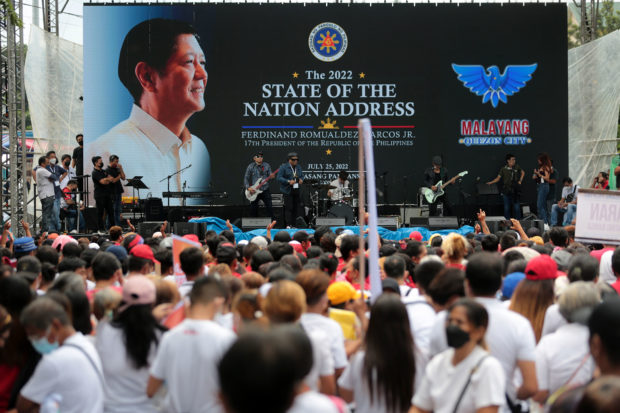
CELEBRATION | Supporters of President Marcos gather a few meters away from the House of Representatives in Quezon City on Monday to listen to his first State of the Nation Address and hold a street party. (Photo by GRIG C. MONTEGRANDE / Philippine Daily Inquirer)
MANILA, Philippines — President Ferdinand Marcos Jr.’s first State of the Nation Address (Sona) drew praise for its “technical” merits in addressing economic growth and high prices, but it was found wanting on specific details and the lack of clarity on its agrarian reform agenda.
“I think the target audience was the business [community] and maybe the supporters whom he has to convince,” Joseph Roxas, president of stock brokerage house Eagle Equities, told the Inquirer.
Michael Ricafort, the chief economist at Rizal Commercial Banking Corp., appreciated specific policies such as the proposed value-added tax on digital services, which could raise revenues of P11.7 billion next year.
“President Marcos’ Sona covered a lot of economic-related priorities and reiterated his economic team’s earlier signals, especially economic growth targets and fiscal management,” Ricafort said.
The Makati Business Club said the proposals such as ease of paying taxes and boosting of internet connectivity would “energize” the business sector, especially the micro, small and medium enterprises, in the advent of digitalization.
The speech was praised for its emphasis on the continuity of infrastructure projects, especially those using the Public-Private Partnership route.
Tourism booster
Marcos also mentioned the need to upgrade and build more airports to support its tourism agenda.
“The construction of new international airports will help boost tourism targets, generate economic growth that will create employment opportunities in the aviation, travel and tourism industries,” Philippine Airlines president Stanley Ng said on Monday.
Foreign Buyers Association of the Philippines president Robert Young told the Inquirer that Marcos could have given the manufacturing industry more focus as this sector could lessen the country’s import dependence.
Roxas also said he hoped the president would mention support for the mining sector to generate new revenues amid rising commodity costs.
Philippine Chamber of Commerce and Industry president George Barcelon said Marcos could have touched on bringing in more investments to the healthcare sector.
In a statement to the Inquirer, German-Philippine Chamber of Commerce and Industry executive director Christopher Zimmer said they were encouraged by Mr. Marcos’ focus on renewable energy given the interest from German companies to invest in the Philippines.
Not enough
Leonardo Montemayor, chair of the Federation of Free Farmers, wanted clarity on the imposition of a one-year moratorium on land amortization and interest payments.
“Shouldn’t all amortizations (past, present and future) be waived?” said Montemayor.
Samahang Industriya ng Agrikultura (Sinag) executive director Jayson Cainglet said suspending payments is a “welcome development,” adding the farmers’ conditions have not improved yet the cost of producing rice, corn and other agricultural produce had continuously increased.
Kilusang Magbubukid ng Pilipinas said suspending amortization payments through legislation was long overdue.
“This would have had the most impact during the pandemic. Yet, its one-year duration is insufficient,” it added.
The Power for People Coalition (P4P) said Marcos’ renewable energy agenda ran contrary to the nuclear and liquefied natural gas push of his administration.
“Renewable energy is a top priority not just by saying it, but committing to minimizing, then eliminating the use of fossil fuels to protect the environment and consumers. It’s disappointing to hear him talk about incentives and bill for gas and action point for nuclear but no actual plans for renewable energy,” said P4P convener Gerry Arances.
Philippine Energy Efficiency Alliance president Alexander Ablaza said the energy efficiency industry was hoping the government would fully implement the Energy Efficiency and Conservation Act to achieve energy security and decarbonization objectives of the Philippines.
RELATED STORIES
FULL TEXT: President Marcos’ 1st Sona
Senators praise SONA for tackling key issues